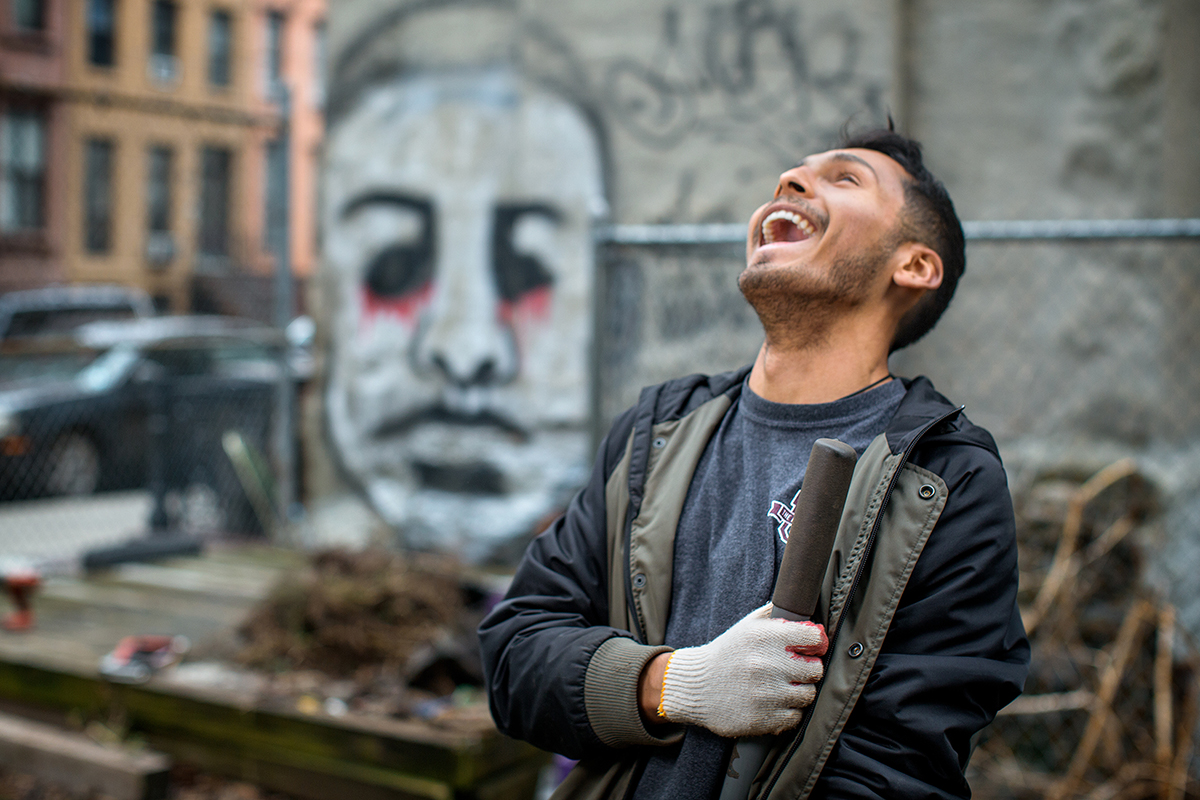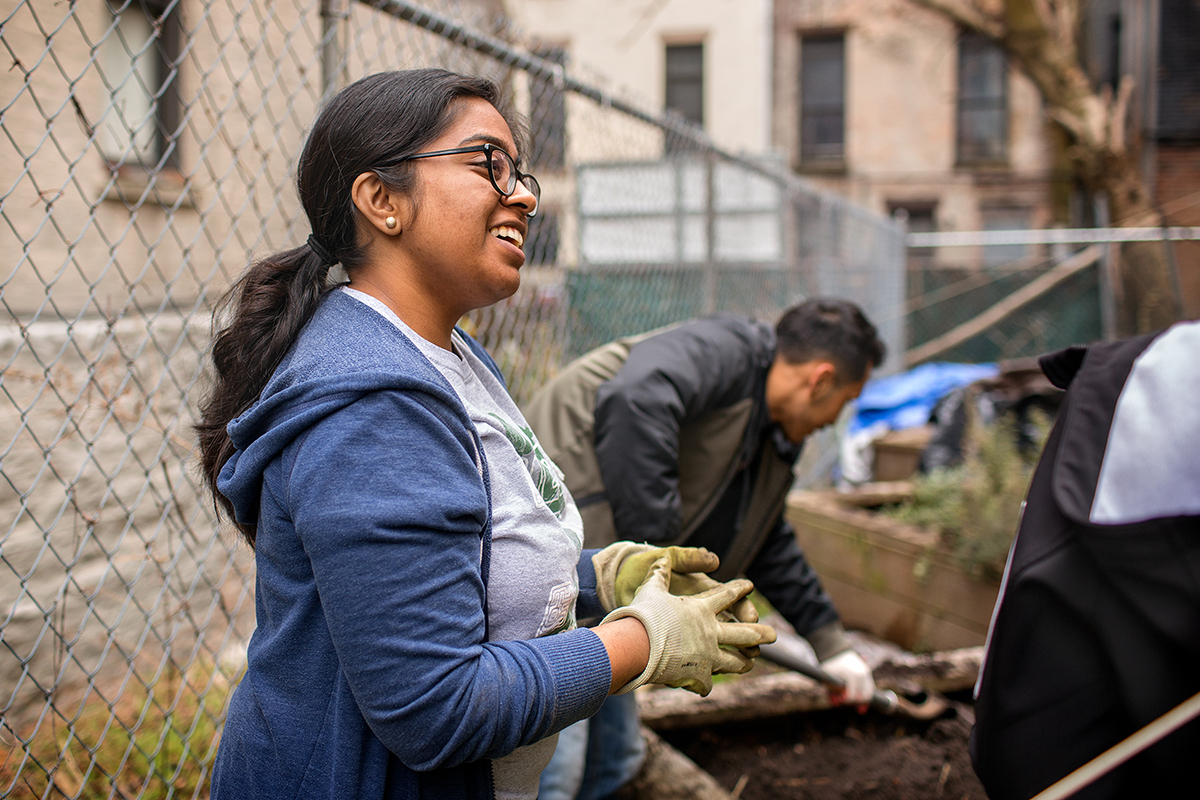Students' green thumbs help Harlem Grown's garden thrive
By Tom Fleischman

While many college students see spring break as a chance to rest, celebrate and gear up for the push toward semester’s end, a few use the week off to make a difference in the lives of people for whom small acts of kindness can mean so much.
Such was the nature of Alec Martinez’s week off, spent with five fellow Cornell undergraduates helping to create a sensory garden for children in collaboration with Harlem Grown, a New York City nonprofit. Martinez and his friends were in the city April 3-6 as members of the Alternative Breaks (Alt Breaks) program, which promotes service-learning through direct engagement with various communities.
“The work was definitely tough, but it was incredibly satisfying,” said Martinez ’18, an urban and regional studies major from Laredo, Texas. “The great thing about Alternative Breaks is, it’s not just a ‘drive-by’ volunteer opportunity, something we can put on our résumés and we’re done. These relationships matter.”
A program of Cornell’s Public Service Center (PSC), Alt Breaks aims to heighten social awareness, enhance students’ personal growth and advocate lifelong social action. Alt Breaks’ inaugural Harlem Grown trip was one of 10 New York City projects involving more than 70 Cornell students this spring.
Since 1999, more than 2,000 students have participated in Alt Breaks, according to Joyce Muchan ’96, the PSC’s assistant director for student programs.

“Alternative Breaks provides an opportunity for students to learn about social issues in the communities they engage with,” Muchan said. “The goal is that it will lead to lifelong active citizenship.”
Alt Breaks connected with Harlem Grown through trip leader Christine Liu ’17, a policy analysis and management major from Chicago, who volunteered at Harlem Grown as a Cornell Urban Scholar in the summer of 2015. When an opportunity to welcome a new partner presented itself, Liu, co-president of Alt Breaks, proposed Harlem Grown.
In its first year, the partnership with Harlem Grown had to be built from the ground up, so Liu took care to recruit “really motivated individuals who are passionate and had a level of understanding about the issues of urban farming already,” she said. “Generally, no experience is required, but for this trip we wanted people who could hit the ground running.”
All Alt Breaks projects begin with a student-led, 12-week curriculum so participants can better understand the missions of the agencies with which they will work. In February, Harlem Grown founder Tony Hillery and director of development Vanessa Vincent came to Cornell to meet with the team and faculty advisers to discuss the organization’s initiatives.
Alternative Breaks
Other New York trips taken by Alternative Breaks participants included:
Womankind: The center helps women and their children overcome domestic violence and other forms of abuse by empowering them to govern their own lives.
Girls Educational and Mentoring Services (GEMS): Empowering females ages 12 to 24 who have experienced commercial sexual exploitation and domestic trafficking. Giving Alternative Learners Uplifting Opportunities (G.A.L.L.O.P.): Nonprofit offers therapeutic horsemanship programs to people who face developmental, emotional, social and physical challenges.
Goddard Riverside Community Center: Meets the diverse needs of New York City’s children, youth, seniors and families through programs and services that provide food, shelter and access to education.
New Settlement Apartments: Bronx organization has a proven record of community youth development, service and organizing toward education reform.
New Alternatives: Three agencies (New Alternatives, True Colors Residence, Sylvia’s Place MCCNY Homeless Youth Services), which all advocate for LGBT young people.
West End Intergenerational Residence: A mixed-age facility which provides temporary housing and support services to young mothers (ages 18-24) who are pregnant or with one or two children age 7 and younger, and also is home to 40 single, low-income adults ages 55 and older.
Hillery founded Harlem Grown in 2011 to help inspire children in one of the nation’s poorest communities. According to Hillery, 90 percent of Harlem’s kids live below the poverty line, more than 98 percent are in the Supplemental Nutrition Assistance Program (food stamps) and 40 percent live in homeless shelters.
“That’s what we’re fighting,” Hillery says in a video on the Harlem Grown website.
The organization wanted to build a sensory garden for pre-kindergarten children in a space on West 131st Street between Fifth Avenue and Malcolm X Boulevard. Hillery told the Cornell students what he had in mind but let the team come up with ideas for the 16-foot-by-16-foot raised flower bed.
“They gave us a general idea of their goals for it,” Liu said, “and they gave us a lot of flexibility and took our ideas very seriously, which was great.”
The team decided on flowers that would stimulate children’s sense of touch, smell and sight, and added a tic-tac-toe board and bamboo xylophone to further engage kids.
The team worked from 9 a.m. to 5 p.m., with a break for lunch. The first day was the most intense, Martinez said, as they had to break up existing flower beds and transfer soil for the new sensory bed.
“Fortunately, everyone on the team was very motivated and incredibly hard-working,” he said.
Students spent their nights in sleeping bags at either West End Presbyterian Church or the Church of St. Matthew and St. Timothy, both on the Upper West Side. A powerful part of each day came at the end, when students from the various programs gathered for an hour of mandatory reflection before turning in.
“After a long day, everyone is ready for bed,” said Lavannya Pulluveetil Barrera ’17, an environmental and sustainability sciences/international agriculture and rural development major, “but we made sure to set aside an hour for conversation, to talk about what we experienced, how did you feel, what went well, what didn’t. I think that really brought us together in a lot of personal, deep ways.”
For Liu, the experience was particularly impactful as it was her suggestion that Harlem Grown be included in Alt Breaks. She is already looking forward to returning to the 131st Street garden, as a graduate of both Cornell and the program.
“I’ll be able to talk about what we did that inaugural year,” she said, “and given how much I’ve seen of Harlem Grown already, I can’t imagine how much more it will have grown in a few years.”
Other students participating were Allyson Jones ’19, a biological sciences major; Madeleine Tom ’19, global and public health sciences; and Georgia Grzywacz ’20, environmental and sustainability sciences.
Media Contact
Get Cornell news delivered right to your inbox.
Subscribe